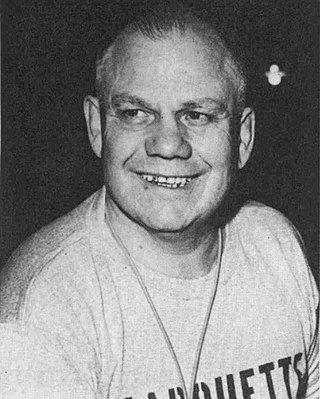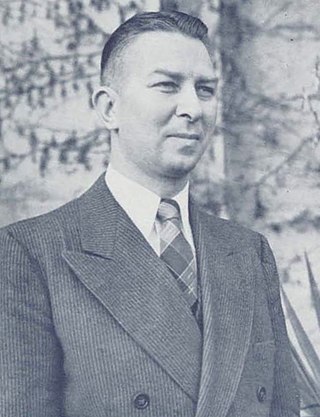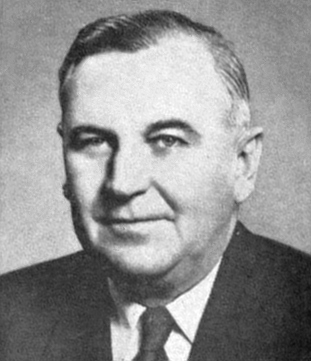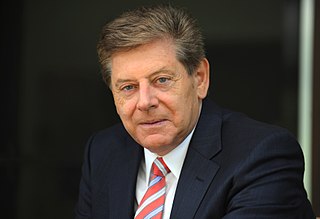Related Research Articles

The prime minister of Japan is the head of government of Japan. The prime minister chairs the Cabinet of Japan and has the ability to select and dismiss its ministers of state. The prime minister also serves as the commander-in-chief of the Japan Self Defence Forces and is a sitting member of either house of the National Diet.

The Twenty-second Amendment to the United States Constitution limits the number of times a person can be elected to the office of President of the United States to two terms, and sets additional eligibility conditions for presidents who succeed to the unexpired terms of their predecessors. Congress approved the Twenty-second Amendment on March 21, 1947, and submitted it to the state legislatures for ratification. That process was completed on February 27, 1951, when the requisite 36 of the 48 states had ratified the amendment, and its provisions came into force on that date.

Tetsu Katayama was a Japanese politician who served as prime minister of Japan from 1947 to 1948. He was the first socialist to serve as Japanese prime minister, and the last non-member of the Liberal Democratic Party or its forerunners to serve until 1993.

The Governor-General of India was the representative of the monarch of the United Kingdom in their capacity as the emperor/empress of India and after Indian independence in 1947, the representative of the monarch of India. The office was created in 1773, with the title of governor-general of the Presidency of Fort William. The officer had direct control only over his presidency but supervised other East India Company officials in India. Complete authority over all of British territory in the Indian subcontinent was granted in 1833, and the official came to be known as the governor-general of India.

Rajendra Prasad was an Indian politician, lawyer, journalist and scholar who served as the first president of India from 1952 to 1962. He joined the Indian National Congress during the Indian independence movement and became a major leader from the region of Bihar. A supporter of Mahatma Gandhi, Prasad was imprisoned by British authorities during the Salt Satyagraha of 1930 and the Quit India movement of 1942. After the constituent assembly 1946 elections, Prasad served as 1st Minister of Food and Agriculture in the central government from 1947 to 1948. Upon independence in 1947, Prasad was elected as President of the Constituent Assembly of India, which prepared the Constitution of India and which served as its provisional Parliament.

Charles Marion La Follette was an American lawyer and politician.

Edgar S. Hickey was an American college basketball and college football coach. He coached basketball at his alma mater of Creighton University, Saint Louis University (1947–1958) and Marquette University (1958–1964), compiling a 429–230 record. Hickey also served as the head football coach at Creighton in 1934, tallying a mark of 2–7. After retiring from coaching, Hickey managed the American Automobile Association headquarters in Terre Haute, Indiana. He was inducted into the Naismith Memorial Basketball Hall of Fame in 1979 and the National Collegiate Basketball Hall of Fame in 2006. Hickey died of a heart attack on December 5, 1980, in Mesa, Arizona.

Howard Andrew "Hobby" Hobson was an American basketball player and coach of football, basketball, and baseball. He served as the head basketball coach at Southern Oregon Normal School—now Southern Oregon University—from 1932 to 1935, at the University of Oregon from 1935 to 1944 and again from 1945 to 1947, and at Yale University from 1947 to 1956, compiling a career college basketball record of 401–257. Hobson's 1938–39 Oregon basketball team won the inaugural NCAA basketball tournament. Hobson authored numerous books on the subject of basketball. He was also the head football coach at Southern Oregon for 1932 to 1934, tallying a mark of 12–7–1, and the head baseball coach at Oregon from 1936 to 1947, amassing a record of 167–75–1. Hobson was inducted into the Naismith Memorial Basketball Hall of Fame as a coach in 1965.

Donald Stuart Russell was an American politician, attorney, judge, and academic administrator from South Carolina. A Democrat, Russell was elected Governor of South Carolina in 1962 and served from 1963 to 1965, which was followed by a stint as U.S. Senator from South Carolina from 1965 to 1966.

Harrison Samuel Francis was an American football player and coach, Olympic shot putter, and Army officer.

Paul O. Bixler was an American football player, coach, and administrator and basketball coach. He served as the head football coach at Ohio State University for one season in 1946 and at Colgate University from 1947 to 1951, compiling a career record of 18–30–4. Bixler was also the head basketball coach at the University of Akron (1936–1939) and Colgate (1939–1941), tallying a mark of 52–27. He later served as director of player personnel for the Cleveland Browns of the National Football League (NFL).

George Donoghue O'Brien was a politician from the U.S. state of Michigan who served as a member of the U.S. House of Representatives on three separate occasions.

Ralph Harvey was an American politician who served six terms as a U.S. Representative from Indiana from 1947 to 1959, then again for three more terms from 1961 to 1966.

James William Robinson was an American attorney and politician who served as a member of the United States House of Representatives for Utah's 2nd congressional district from 1933 to 1947.

Thurman Charles Crook was an American politician who served one term as a United States representative from Indiana from 1949 to 1951.

Raymond Smiley Springer was an American attorney and jurist who served as a member of the U.S. House of Representatives from Indiana from 1939 to 1947.

Eduard Oswald is a German politician who served as one of the vice presidents of the German Bundestag from 2011 until 2013. A member of the Christian Social Union, he was nominated by the CDU/CSU parliamentary faction to succeed Gerda Hasselfeldt.
Ukku Banda Wanninayake was a Ceylonese politician. He served as Minister of Finance from 1965 to 1970.
References
- ↑ Khademian, Anne M. (1992). The SEC and Capital Market Regulation: The Politics of Expertise. University of Pittsburgh Press. p. 234. ISBN 9780822976899.
- ↑ https://time.com/archive/6773480/trumans-choice/
